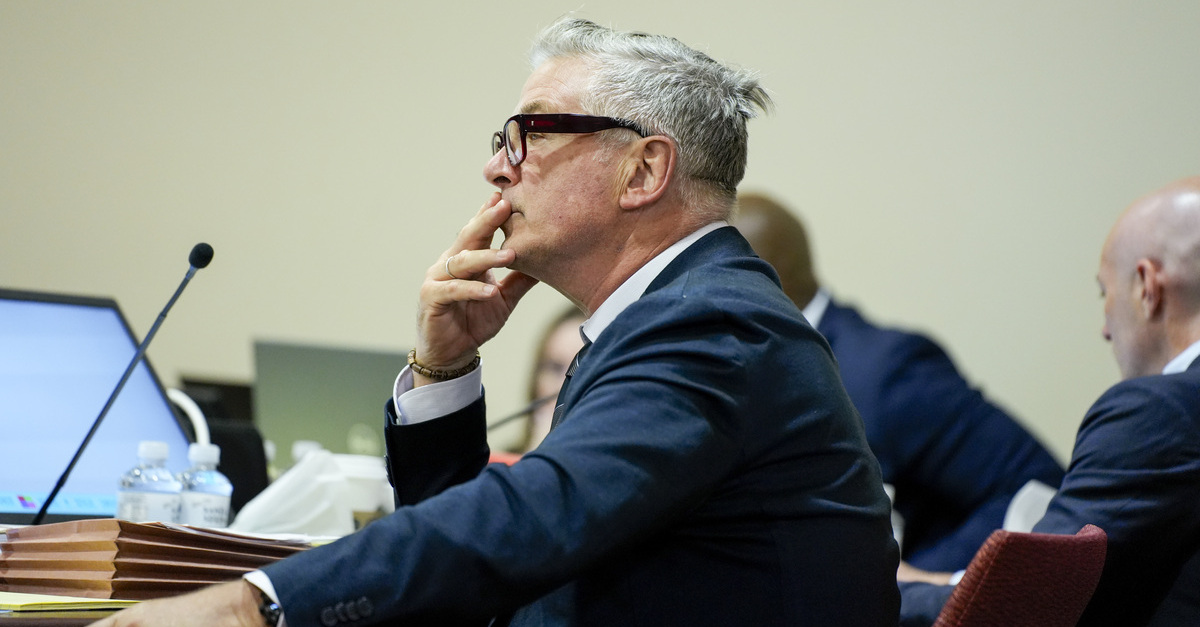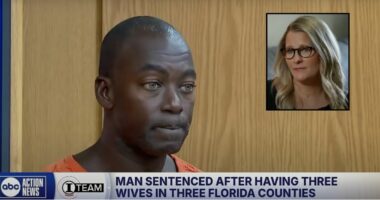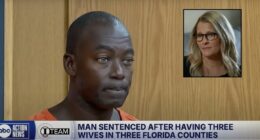
Alec Baldwin sits in court during his trial in Santa Fe, N.M., Thursday, July 11, 2024. Baldwin is facing a charge of involuntary manslaughter in the death of a cinematographer on the set of the film “Rust.” (Ramsay de Give/Pool Photo via AP)
The lead defense attorney representing Alec Baldwin, 66, made some progress arguing investigators were sloppy in their work as one such crime scene technician took the stand on day two of the actor’s involuntary manslaughter trial on Thursday in Santa Fe, New Mexico.
The initial aftermath of the on-set shooting that took the life of Halyna Hutchins, 42, during production of the Baldwin-produced Western movie “Rust” was, by all accounts, hectic and unlike anything anyone there — law enforcement or film industry personnel — had ever experienced.
Defense attorney Alex Spiro aimed to show jurors that limited experience with such a crime scene — and all its moving parts — resulted in a hopelessly doomed and dimly illuminated case.
Santa Fe County crime scene technician Marissa Poppell appeared somewhat flummoxed near the end of her cross-examination while special prosecutor Kari Morrissey did not seem to like how things were going either as the court broke for a two-hour lunch.
Part of the defense’s theory of the case is that almost from the beginning, law enforcement failed to properly secure and inspect the relevant evidence needed to solve the mystery of how the live bullet got onto the set and later found its way into the killing gun.
While looking over photos with the witness, the defense attorney sought to establish that Poppell complained about the length of the search at a warehouse owned by PDQ Arm and Prop — the company that supplied the production with guns and ammunition.
“Did you and detective Hancock start joking around that it was going to take too long to search every box?” Spiro asked.
Poppell said she could not recall.
“Do you deny it?” the defense attorney pressed.
“No,” the witness admitted.
Attention then turned to the specific manner in which Poppell conducted her search of those ammunition boxes.
More Law&Crime coverage: Objections fly as court rules meant to prohibit influencing jurors are quickly ignored during Alec Baldwin ‘Rust’ trial
An integral part of checking whether ammunition is live or a so-called “dummy” round is by individually shaking each round before its use — and checking for the telltale sign of BB pellets rattling — a procedure that was not followed on the set of the film.
Through the previous manslaughter case against “Rust” armorer Hannah Gutierrez-Reed — who was convicted of the same charge Baldwin now faces — and the present case, in both motions and testimony, this lack of protocol has proved to be a point of contention.
“Do you deny you — in parts of your search — just picking up a box and shaking it to see if it shook or not?” Spiro asked. “Do you deny that.”
Again, Poppell answered in the negative.
“And, so, but if you shook an entire box to see if it had a rattle in it, you wouldn’t be able to be sure whether or not every single live round — it was all live rounds or a commingled group, correct?”
The witness agreed with Baldwin’s attorney.
“In fact, that’s the entire basis of the case of what you believe the armorer to have done — commingled live and dummies, right?” Spiro pressed.
Poppell again agreed with the defense’s question.
“And, yet, at the search being conducted to find the source of the lethal round, law enforcement is doing the very same thing that you’re complaining about the armorer doing on the set, right?”
To which the witness replied: “Yes.”
More Law&Crime coverage: Prosecutor says Alec Baldwin ‘did his own thing’ and ignored safety in opening statement of manslaughter trial, while defense outlines a ‘mystery’ the state did not even try to solve
Spiro then moved back to the thoroughness of the underlying search.
“And when you left that search, you’re not, as you sit here, sure you got every live round, are you?” the defense attorney asked.
“No,” Poppell replied.
Spiro then moved in for a coup de grace.
“And, actually, if you look at the boxes inside of that location, you didn’t even search half of them,” he said before taking an exceedingly long pause and then asking the witness: “Did you?”
To which Poppell replied: “I don’t recall.”
“So, then, why on direct examination, if you do not recall, did the prosecutor ask you and you tell this jury that you were confirming that you searched and found every single live round?” Spiro asked. “Why did you testify to that?”
Poppell tried to clarify. She said: “I found what I believed to be all the live rounds at the warehouse.”
“But that’s not what you said,” Spiro replied.
More Law&Crime coverage: ‘I’m having real difficulty with the state’s position’: Judge bars key prosecution argument in Alec Baldwin manslaughter case over fatal ‘Rust’ shooting
The attorney and the witness went back and forth a bit more before a clearer picture came into view over Poppell’s earlier testimony about the thoroughness of her ammunition storage search.
“When you originally said that you searched every box, OK, that, itself, is not accurate, correct?” Spiro asked.
“Correct,” the witness conceded.
Spiro then quickly moved to a different part of the warehouse search. Or, rather, a search the defense says did not occur.
In the end, the defense elicited testimony that though the search warrant called for surveillance footage to be seized, the evidence suggests Poppell did not even look for such footage.
Again, the witness, by the end, seemed defeated.
“Tell the members of the jury what you did to search for surveillance videos that satisfied you that you complied with the warrant’s order,” Spiro again pressed the crime scene professional. “Tell the jury.”
Poppell responded: “I don’t recall looking for surveillance footage.”
Have a tip we should know? [email protected]







